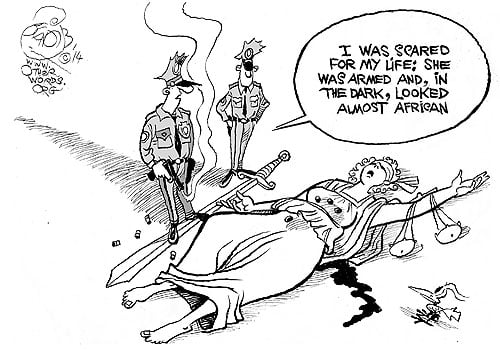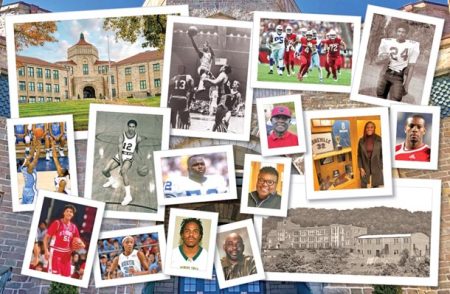Ferguson, Cleveland, NYC, and Chief Anderson: What Have We Learned?

OtherWords by Khalil Bendib
By Jim Abbott –
It is an ironic coincidence that the fatal shootings by white police officers of 18-year-old Michael Brown in Ferguson and 12-year-old Tamir Rice in Cleveland, the chokehold death of Eric Garner in New York, and the forced retirement of William Anderson, Asheville’s first African American Police Chief, all occurred in the same time frame—underscoring the fact that critical issues related to race and law enforcement are not only “out there” but also here at home. So the question for us here in Asheville is: Where do we go from here?
Having listened to many voices over the past several weeks, particularly those of African Americans, I have gleaned at least these 10 recommendations for moving forward.
• We need to continue and expand Chief Anderson’s emphasis on community policing. Speaking as one who lives in a historically African American neighborhood, I can testify that having a neighborhood resource officer present at our neighborhood association meetings and other community events has made a huge difference in the attitudes here.
• We need to re-double our efforts to recruit and promote more officers of color. Ferguson, especially, is a prime example of what can happen when that is not the case.
• We need to invest in body cameras for all of our police officers. Body cameras are designed to protect both the police and the public, and where they have been instituted, violent confrontations between the police and the public have been reduced, fewer complaints against police officers have been made, and fewer officer-caused homicides have occurred.
• We need to examine and, where necessary, tighten our laws and policies regarding the use of deadly force by our police. Police need protection, too, but we do not want our police relying prematurely on deadly force if there are less violent ways to defuse or disarm potentially dangerous situations.
• We need to give our next Chief the authority he or she needs to lead the department. Because our present Civil Service Board has the power to challenge and overrule almost any decision the Police Chief makes, it is nearly impossible for him or her to implement needed internal changes and reform measures. Of the 558 municipalities in North Carolina, only six still have Civil Service Boards, and none of those has as much power as Asheville’s has. Our State Legislators need to get the law changed in order to bring Asheville in line with the rest of the state. It is not just an authority issue, it’s an accountability one; we need to know where the buck really stops.
• We need more cultural competence training, more mediation training, and more community involvement in the training of our police officers. The more we can do to de-escalate tense situations before they become violent, the fewer lives will be lost and the better off we’ll all be.
• We need to pay our police officers better. Policing is an extremely difficult and demanding job, and if we want a well-trained, professional police force, we need to be willing to pay for it.
• We need to help our young people know what to do (and what not to do) whenever they are stopped by a police officer. Even as we work on changing the overall system so that people of color are not targeted or treated unfairly, it is important that our young people not do anything that may put their lives at risk. Injustices surely need to be addressed, but seldom if ever on the street during an arrest, where the consequences can be deadly.
• We need to file complaints, whenever we have them, regarding police behavior. The vast majority of our police officers are dedicated public servants who try to defend and protect the community, and they do not want to be stereotyped with the few who abuse their authority. So it is important that the public document specific cases of wrong-doing, not only to protect the community but the conscientious officers as well.
• We need more community input in general in the areas of policy making and police review. By working together, we can reduce both crime and violence, assure citizens that their complaints are getting a fair hearing, and create a system of law enforcement that benefits everyone, police and community alike.
Jim Abbott is a retired Episcopal priest who lives in Asheville, NC.






